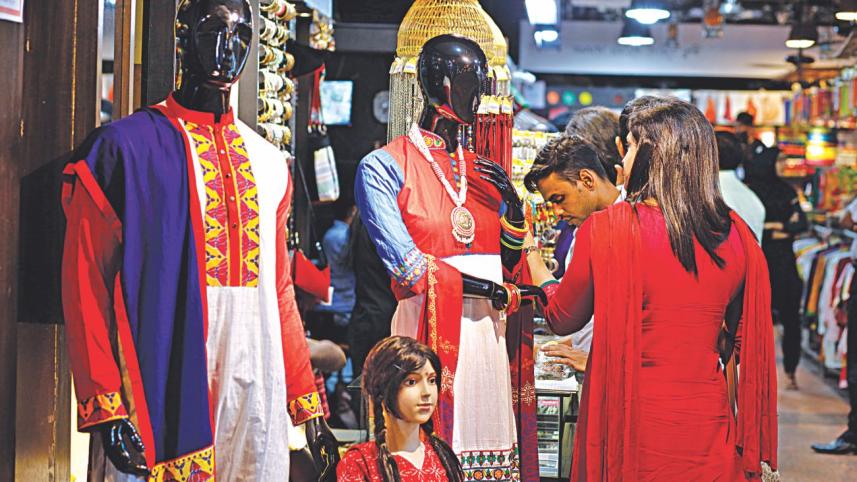Nababarsha Celebrations: Businesses get a big boost

Over the last one week or more, mobile phone users have been flooded with SMSs from fashion houses, retail chains and restaurants offering special incentives and discounts to increase sales before Pahela Baishakh celebration.
Bangla New Year is knocking at the door. So, elaborate preparation is underway to welcome 1424 of the Bangla calendar.
Shops at large malls in Dhaka have been adorned with colourful, decorative festoons to draw customers' attention.
“This is a big festival after Eid and people buy clothes and accessories to celebrate it. We are no exception,” said Zeenat Rehenuma, a housewife from the capital's New Eskaton area, after she had bought clothes for her son, husband and relatives.
Her family spends a good amount of money on gifts ahead of Pahela Baishakh, she said.
“I also get gifts from my relatives. It has become a tradition.”
Zeenat is one of many who have been buying clothes and other lifestyle products for several years ahead of the biggest carnival of the nation, thanks to marketing campaigns by local fashion boutiques, rising income and growing public interests in sharing joy and festivity.
Once known for Halkhata or opening new books of accounts by businesses on the very first day of Bangla calendar year, the festival has gradually become a celebration for all since it stands out as an identity for Bangalees to be proud of.
It got Unesco's recognition as intangible cultural heritage in 2016.
Today, Pahela Baishakh, also known as Nababarsha, has emerged as one of the major shopping seasons after Eid-ul-Fitre and Eid-ul-Azha, two biggest religious festivals of majority Muslims in the country.
Increased spending targeting Pahela Baishakh has not only given a boost to local boutiques, handlooms and artisans but also helped spur activities in the growing economy where wholesale and retail trade accounts for 14.02 percent of the country's $195 billion GDP.
for 14.02 percent of the country's $195 billion GDP.
Sales are growing every year bringing cheers to businesses ranging from local fashion boutiques, footwear, and handicrafts to sweets, traditional snacks and toys.
But fashion and lifestyle items as well as food and beverages are the major attraction.
All brands have seen a high growth in the last two years, said Tanvir Hossain, assistant general manager of Aarong, country's largest lifestyle products retailer.
“The big push came after the government started giving bonus to public sector employees for celebrating the festival.”
Apart from clothing, the demand for home décor items, clay pottery and home textiles is also on the rise.
“This year, we have seen better response from customers compared to the previous year. This [Pahela Baishakh] is becoming a shopping season as more and more people celebrate the festival,” Tanvir said.
However, some shop owners said their sales were not as expected.
Sales in suburbs also rise ahead of the Bangla calendar year, said SA Quader Keron, chairman of Bangladesh Shop Owners Association. Still, it is not as much as in Eid-ul-Fitre.
Along with fashion houses and lifestyles item sellers, electronics and home appliance marketers, furniture sellers and retail chains have come up with offers to secure a slice of the increased consumer spending.
“It appears that Pahela Baishakh is one of the biggest secular festivals in the sub-continent. Once it was treated as a cultural festival. Now it is more like a familial and social celebration,” said Azharul Haque Azad, president of Fashion Entrepreneurs Association of Bangladesh (FEAB).
Customer turnouts increased since last Friday and sales have been higher than expected this year from a year ago, he said.
“This is because of stability in politics.”
Azharul said local fashion boutique houses may post sales above the target of Tk 1,750 crore during this Baishakhi festival, up from Tk 1,500 crore last year.
“We apprehended that businesses might not meet our expectation level as another festival Eid is very close but shopping spree of customers proved our apprehension wrong,” said Shaheen Ahmmed, vice president of FEAB that represents more than 50 boutiques.
These festivals are driving force of the economy, said Syed Nurul Islam, chairman and chief executive of Well Food, food chain of Well Group.
He expected that sales of sweets will rise because of purchases by corporate clients, banks and insurance companies as well as individual customers.
Bankers also feel that growing activities centring on Pahela Baishakh are benefiting the economy.
“We have seen some demands for small loans ahead of Baishakh,” said Abdul Halim Chowdhury, managing director of Pubali Bank.
Shafiqul Alam, managing director of Jamuna Bank, said rising economic activities gives “a sign of prosperity of consumers.”
However, private employees don't have extra cash like those of the public sector to spend on this occasion since they don't get Baishakhi bonus.
Take the case of Shaheen, an employee of a private firm. He came to Bashundhara City on Monday to buy a dress only for his wife to bring a festive mood at home.
“I cannot afford to spend a lot with my limited income,” he said.




 For all latest news, follow The Daily Star's Google News channel.
For all latest news, follow The Daily Star's Google News channel.
Comments